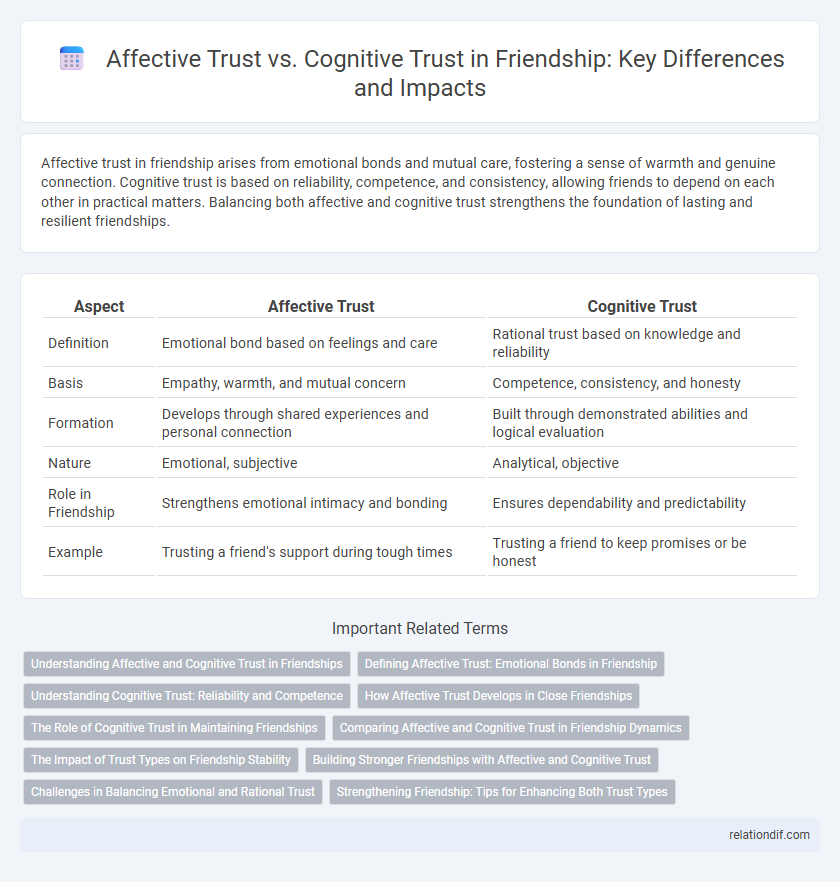Affective trust in friendship arises from emotional bonds and mutual care, fostering a sense of warmth and genuine connection. Cognitive trust is based on reliability, competence, and consistency, allowing friends to depend on each other in practical matters. Balancing both affective and cognitive trust strengthens the foundation of lasting and resilient friendships.
Table of Comparison
| Aspect | Affective Trust | Cognitive Trust |
|---|---|---|
| Definition | Emotional bond based on feelings and care | Rational trust based on knowledge and reliability |
| Basis | Empathy, warmth, and mutual concern | Competence, consistency, and honesty |
| Formation | Develops through shared experiences and personal connection | Built through demonstrated abilities and logical evaluation |
| Nature | Emotional, subjective | Analytical, objective |
| Role in Friendship | Strengthens emotional intimacy and bonding | Ensures dependability and predictability |
| Example | Trusting a friend's support during tough times | Trusting a friend to keep promises or be honest |
Understanding Affective and Cognitive Trust in Friendships
Affective trust in friendships is built on emotional bonds, empathy, and mutual care, fostering a sense of security and intimacy between friends. Cognitive trust, however, relies on the belief in a friend's reliability, honesty, and competence based on past experiences and consistency. Understanding the balance between affective and cognitive trust is essential for cultivating lasting and resilient friendships.
Defining Affective Trust: Emotional Bonds in Friendship
Affective trust in friendship refers to the emotional bonds characterized by feelings of care, empathy, and mutual support, fostering a deep sense of security and connection. This type of trust is built through shared experiences, emotional vulnerability, and consistent positive interactions that reinforce the relationship's warmth. Unlike cognitive trust, which is based on reliability and competence, affective trust hinges on emotional investment and the belief that friends will respond to one's needs with understanding and compassion.
Understanding Cognitive Trust: Reliability and Competence
Cognitive trust in friendship is built upon the consistent reliability and demonstrated competence of a friend, fostering confidence in their actions and decisions. This form of trust involves the assessment of a friend's ability to meet expectations through dependability and skill, strengthening the foundation of the relationship. Understanding cognitive trust highlights the importance of predictability and expertise in creating a stable, long-lasting friendship.
How Affective Trust Develops in Close Friendships
Affective trust in close friendships develops through consistent emotional support, shared experiences, and vulnerability, creating a strong bond of empathy and care. This type of trust is built over time as friends demonstrate reliability in understanding and responding to each other's feelings. Regular positive interactions that foster emotional connection deepen affective trust, distinguishing it from cognitive trust, which is based more on competence and dependability.
The Role of Cognitive Trust in Maintaining Friendships
Cognitive trust, based on rational evaluation of a friend's reliability and competence, plays a crucial role in maintaining long-term friendships by fostering stability and predictability in interactions. Unlike affective trust, which relies on emotional bonds and feelings of closeness, cognitive trust ensures that friends can depend on each other's consistent behavior and integrity. This form of trust supports conflict resolution and mutual decision-making, reinforcing the durability of social connections.
Comparing Affective and Cognitive Trust in Friendship Dynamics
Affective trust in friendship is rooted in emotional bonds, empathy, and shared experiences, fostering deep personal connections and loyalty. Cognitive trust relies on the assessment of reliability, competence, and consistency, shaping expectations based on rational evaluation of a friend's behavior. Comparing both, affective trust enhances emotional intimacy, while cognitive trust ensures dependable interactions, together creating a balanced and resilient friendship dynamic.
The Impact of Trust Types on Friendship Stability
Affective trust, rooted in emotional bonds and empathy, enhances friendship stability by fostering deep mutual understanding and loyalty. Cognitive trust, based on reliability and competence, provides a foundation of predictability and security that supports long-term relationship endurance. The interplay of affective and cognitive trust creates a balanced dynamic essential for maintaining enduring and resilient friendships.
Building Stronger Friendships with Affective and Cognitive Trust
Building stronger friendships relies on cultivating both affective trust, rooted in emotional bonds and empathy, and cognitive trust, based on reliability and competence. Affective trust deepens connection through shared vulnerability and mutual care, while cognitive trust ensures consistency and dependability in actions. Balancing these trust types creates resilient, meaningful friendships that withstand challenges and foster long-term support.
Challenges in Balancing Emotional and Rational Trust
Balancing affective trust, rooted in emotional bonds and empathy, with cognitive trust based on reliability and competence, presents challenges in friendships due to conflicting expectations. Emotional trust can lead to vulnerability and heightened sensitivity, while cognitive trust demands consistent behavior and logical assessment, causing tension when one outweighs the other. Effective friendship management requires navigating these dynamics to maintain both emotional connection and rational confidence.
Strengthening Friendship: Tips for Enhancing Both Trust Types
Strengthening friendship requires nurturing both affective trust, which stems from emotional bonds and mutual care, and cognitive trust, built on reliability and consistent actions. Regular open communication, demonstrating empathy, and honoring commitments reinforce these trust types, creating a robust foundation for enduring relationships. Engaging in shared experiences and transparent problem-solving further enhances mutual confidence and deepens the friendship's resilience.
affective trust vs cognitive trust Infographic

 relationdif.com
relationdif.com